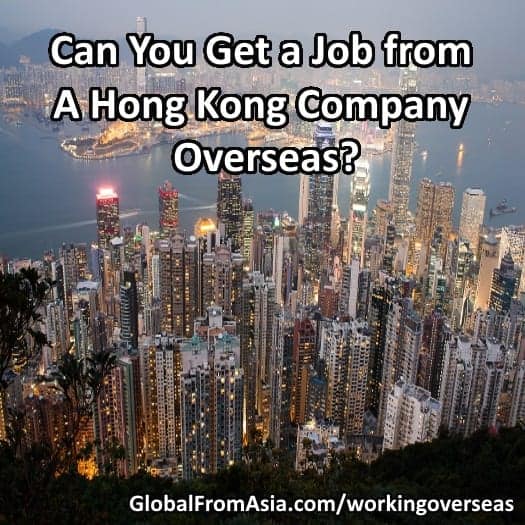This article is originally found here: https://www.globalfromasia.com/workingoverseas/
Do you have a job from a Hong Kong company full time? But living in America most of the time?
When did this insanity start?
Life used to be so simple. We would all stay in our own countries, have our address in the same town as the company we worked in, and pay taxes to that city / state / country.
Nowadays it seems so complex.
But it is awesome. And I get to hear great questions from readers like today’s post.
Let’s share the question here:
(Disclosure: we are not tax professionals, just making a conversation and thought process for your own situation and to ask your own tax professional before making decisions)
Today’s Question
The last two years or so I have been consulting for an American pump manufacturer. Helping them with supply chain and other issues in China, Hong Kong and even Vietnam and India (haven’t been to India physically though).They are now talking about hiring me full-time. It seems that for budget bucket reasons, they want to hire me via their 100%-owned Hong Kong trading company. I would be the first employee there. I really just have one big question set:
How much time would I need to spend in Hong Kong physically to be counted as an employee? And, of course, pay Hong Kong’s beautifully lower income tax rates. My wife and kid are now in California and I would want to spend time with them but if I could do that AND spend time in HK (for the lower taxes) that would be ideal. I am going to be going much more often too — so might as well place me as an employee over there.
Mike – I would really appreciate your time and thoughts on this. Let me know
(Reader’s name removed upon request)
Factors To Consider

As almost all advice, please do you own due diligence. I’m not a lawyer, and am sharing as best to my knowledge and research can provide. Disclaimer, don’t blame me if I am wrong!
Are You American?
I think first question is, are you a US citizen? Believe this will make things more complicated.
Especially if you are living and residing in California, the most expensive state in the United States. They will want your tax income. I believe you are still seen as a California resident, and have to declare this income to the state and pay taxes on it.
Tricky one, as it’s not a US based company.
Where Do You Spend Your Time? Where Do You Deliver The Work / Value?

So, where are you going to be most of the time? Still in California? If you are in USA more than 330 days a year, you fail the exemption status for foreign earned income.
If you are to be outside of America, especially California, for more than 330 days, as an American, this foreign earned income could be exempt from taxes.
But I can’t imagine the US tax department liking you getting paid offshore and sitting at your home office in California most of the time. Make sense?
The Hong Kong Company is Giving Your Proper Employment Contract
They intend to hire you full time, right? So then I would assume you would get an employment contract from them, in Hong Kong.
As an employee in Hong Kong, you would need to then get a Hong Kong ID card. That isn’t a bad thing, it has a lot of perks and advantages. But HK immigration will want the company to see if the company can hire someone in Hong Kong locally first. That is just normal immigration things, Hong Kong is seriously overcrowded and they are getting strict on who they allow to come into the region.
In Hong Kong, to get a job from a Hong Kong company, you’d need to get a proper employment contract as well as a HKID card.
Then, of course as an employee, you and the Hong Kong company hiring you would need to pay the associated taxes in Hong Kong. Which, you mentioned are much lower than in USA and most other parts of the world.
How Will The Hong Kong Company Pay You? HK Bank?

How will this company be paying your salary? I would assume you have to have, or setup, a personal bank account in Hong Kong. Then they would setup payroll and have the funds deposited to your bank account either every couple weeks or monthly.
Will you need to access these funds right away? Will you use these funds to pay for your cost of living in California, USA? If so, I would then imagine you’d have to wire transfer the money from Hong Kong into your American bank account.
That money would then be treated as income in America? You will put those transactions in your personal bank statement. At the end of the tax year you’d have to figure out how to classify that to your tax accountant.
But, to stress, you can’t hide your money in Hong Kong from the US tax authorities anyway. You were never supposed to, but nowadays it is impossible. So you’ll have to declare this income to the IRS and explain that it comes from Hong Kong and that you’re hired by a Hong Kong company.
If you are doing it this way, you’ll be paying monthly bank wiring fee, and then declaring taxes in America as, a sole proprietor? Not sure to be honest.
How Big Is This Company?
The next point to look at, how big is this company? And when I say company, I mean the entity registered in Hong Kong. Doesn’t matter if this company is a massive conglomerate registered in the UK. What matters is how big the company is in Hong Kong.
That means, how much revenue. How big is the “real office” (not a serviced address or virtual office). How many full time staff, located in Hong Kong, and a legal hiring with employment contracts are there. Also, there is a difference between how many local Hong Kong people have jobs as a percentage of how many foreigners have jobs.
Any company that has a lot of locals hired, and is doing a lot of payroll tax is contributing to the local economy. Governments love job creations – for their people.
So these kinds of figures will help in your case as a foreigner in a Hong Kong company.
This is a Local Hong Kong Limited Company (Not Offshore Elect)

I am assuming that this Hong Kong domestic company (as opposed to offshore elect) and paying the 16.5% corporate tax rate on earnings. If you think you can get the 0% offshore election option and you can still get a local job in the company, you’re a bit mistaken.
You can’t have your cake and eat it too.
If you’re an offshore company, that means you have no local Hong Kong operations. One of those factors being a Hong Kong employee – which you are trying to become.
What’s Your Salary? Above or Below Market Value?
Another thing the Hong Kong government looks at, as well as any government, is it is a fair salary? That means is your salary what a local Hong Kong person would be in this same position? If you’re the director of the company trying to give yourself a lower salary to avoid taxes, may not work.
Other cases are if you give a lower salary to yourself or your foreign staff in exchange for support on the employment visa. Some people are willing to take a lower salary just to be able to stay legally in Hong Kong. But this will also raise flags and be problems.
You need to pay what the market will bear for someone in your exact position, in Hong Kong.
Has The Company Tried To Hire a Local?

Are you trying to use this salary and income as a way to immigrate to Hong Kong? There may be instances where the immigration department wants to see if the company has put out a job advertisement to place this position in the job market. That means, give a chance to the local Hong Kong market to get this job if they are capable and willing to accept that salary level.
You may say, why does that matter, the owner and director of the company picked me! Again, this depends on the case of how hard it would be for the company to find a local person to do the same role as you. Maybe you’re so special that no one else in Hong Kong can do this job? There are of course cases where that is true, especially in computer programming and technical roles. There is a big shortage of supply in the job market for this job speciality.
So if you’re working in a position that is in short supply in the Hong Kong job market, you’ll have a better chance of this Hong kong salary scheme you’re working on.
What’s Your Long Term Goal with this Job?
So you need to ask yourself, you’re living in California, you’re American. Your family is there too, you’ll be flying back and forth between the 2 continents. Where do you want to spend your time?
Do you want to immigrate to Hong Kong? Bring your wife and kids here, go through the education system here? Or is this just a temporary income stream at the current employer. You want to use it to get more cash, save some taxes, and build some international experience on your resume.
Nothing wrong with either case. But of course, if your long term plan is to relocate to Hong Kong, going through these hurdles will be more logical. If it is a short term play, you may re-consider all the paperwork and hassles your employer and you will have to go through.
Do You Need / Care About a Hong Kong ID?

Another thing, from the email I got – it seems there is no interest in getting a Hong Kong ID (HKID).
A HKID is a pretty valuable thing to have, wherever you are in the world.
As a local resident in Hong Kong, you will get access to the medical system. Sure, public hospitals are not as good as private – but if you’re in a bind, you can always rely on public hospitals taking care of you.
Related: We talk about Hong kong medical options and insurance plans here.
You’ll also be able to cross into Mainland China much easier. Take it from me, as someone without a HKID, my friends who have it zip past me on the borders. If you’re an international business person going between USA, Hong Kong, and Mainland China – you’ll like to get this ID card if you can.
What Do you Think? Get The Job contract in Hong Kong?
So that covers my points. What do you think?
There are other options for how you’re compensated. You can always be an independent contractor and get paid in cash / wire transfer. You’ll file with your US taxes as an independent contractor and your US tax accountant will be able to classify this.
Disclosure, I am not a tax specialist, and this article is a general guideline and free help for those curious on the topic.
Feedback, comments, and hate mail is welcome!


